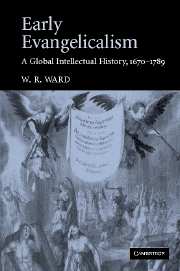Book contents
- Frontmatter
- Contents
- Acknowledgements
- Introduction
- 1 The thought-world of early evangelicalism
- 2 Spener and the origins of church pietism
- 3 The mystic way or the mystic ways?
- 4 The development of pietism in the Reformed churches
- 5 The Reformed tradition in Britain and America
- 6 Zinzendorf
- 7 John Wesley
- 8 Jonathan Edwards
- 9 The disintegration of the old evangelicalism
- Conclusion
- Select and user-friendly bibliography
- Index
3 - The mystic way or the mystic ways?
Published online by Cambridge University Press: 19 July 2009
- Frontmatter
- Contents
- Acknowledgements
- Introduction
- 1 The thought-world of early evangelicalism
- 2 Spener and the origins of church pietism
- 3 The mystic way or the mystic ways?
- 4 The development of pietism in the Reformed churches
- 5 The Reformed tradition in Britain and America
- 6 Zinzendorf
- 7 John Wesley
- 8 Jonathan Edwards
- 9 The disintegration of the old evangelicalism
- Conclusion
- Select and user-friendly bibliography
- Index
Summary
If Spener was frequently caught between prudence and the desire to tap sources of religious vitality on the one hand, and what could in practice be kept within the bounds of the Protestant establishments on the other, the problem was even more acute for his protégé and disciple, August Hermann Francke (1663–1727). For at an early stage an ecclesiastical career was closed to Francke, partly because he was more open to radical and spiritualistic influences; and although, unlike the radical separatists, Francke wanted the ‘true’ church of the faithful to retain its connexion with the establishment, he was more concerned with the pursuit of Christian perfection than with church reform. Much of his life's work was devoted to the support of Protestants in Moscow and Siberia, Silesia and Bohemia, who had no established church system to cling to. Moreover, the great institutions at Halle which came to provide a badge of evangelical orthodoxy as far away as Newcastle-upon-Tyne, South Wales and Georgia were not institutions of church or state, but an application, at the time unique, of the principle of contract to the work of the kingdom of God. So long as Francke was able to retain the sympathy of the Hohenzollern monarchy, as his son and successor, Gotthilf August Francke, was not, he had in a sense a little more elbow-room than was ever available to Spener.
- Type
- Chapter
- Information
- Early EvangelicalismA Global Intellectual History, 1670–1789, pp. 40 - 69Publisher: Cambridge University PressPrint publication year: 2006



